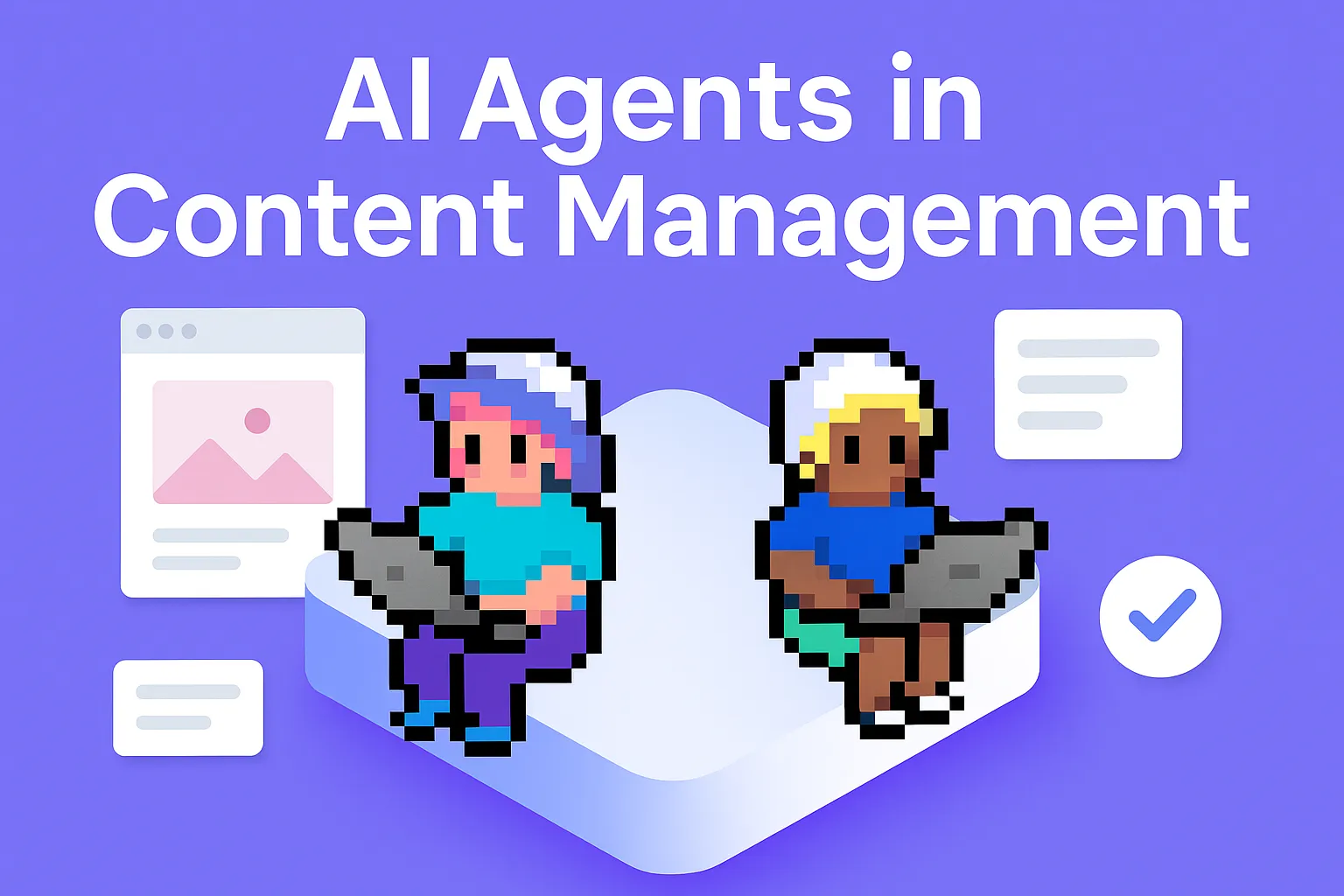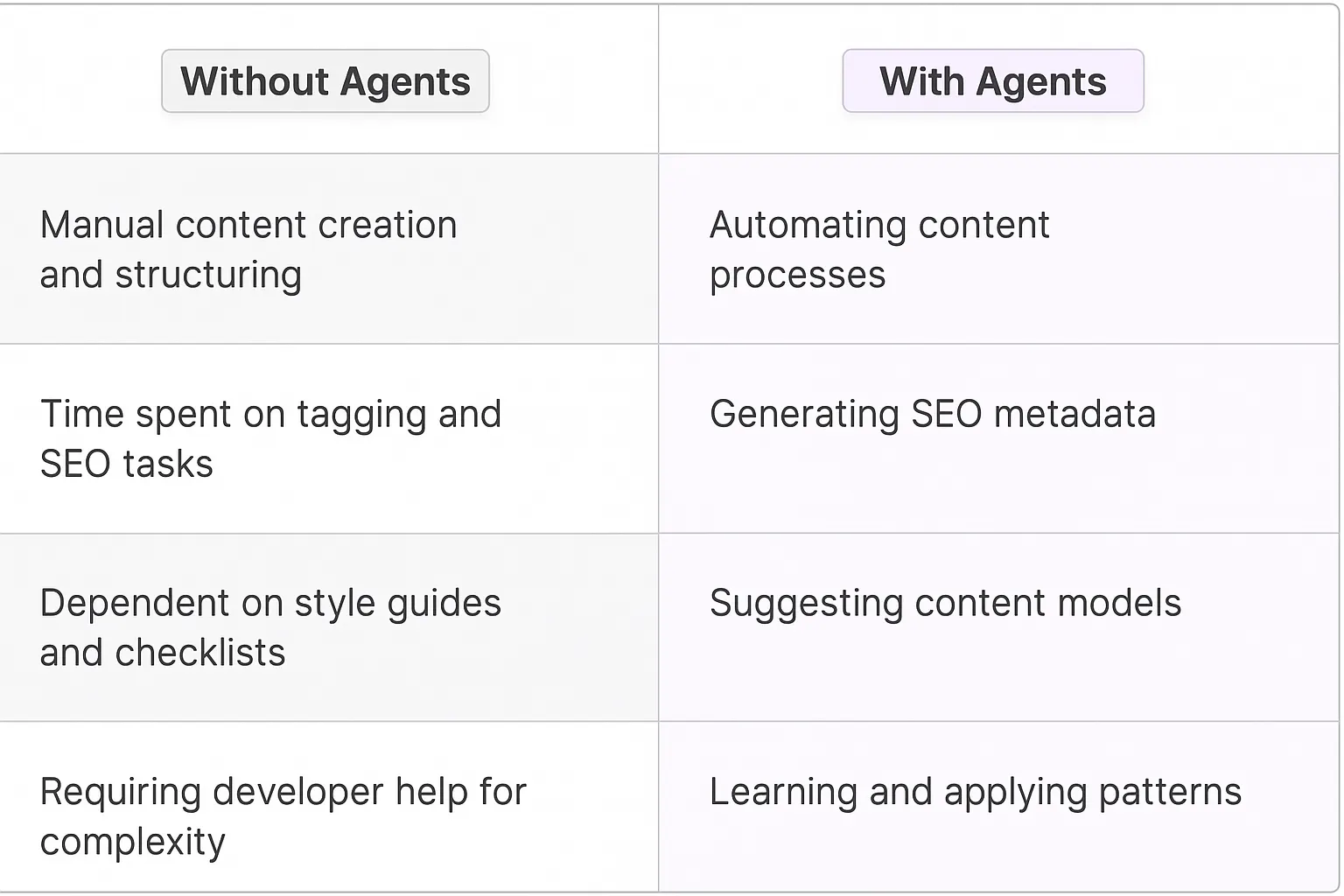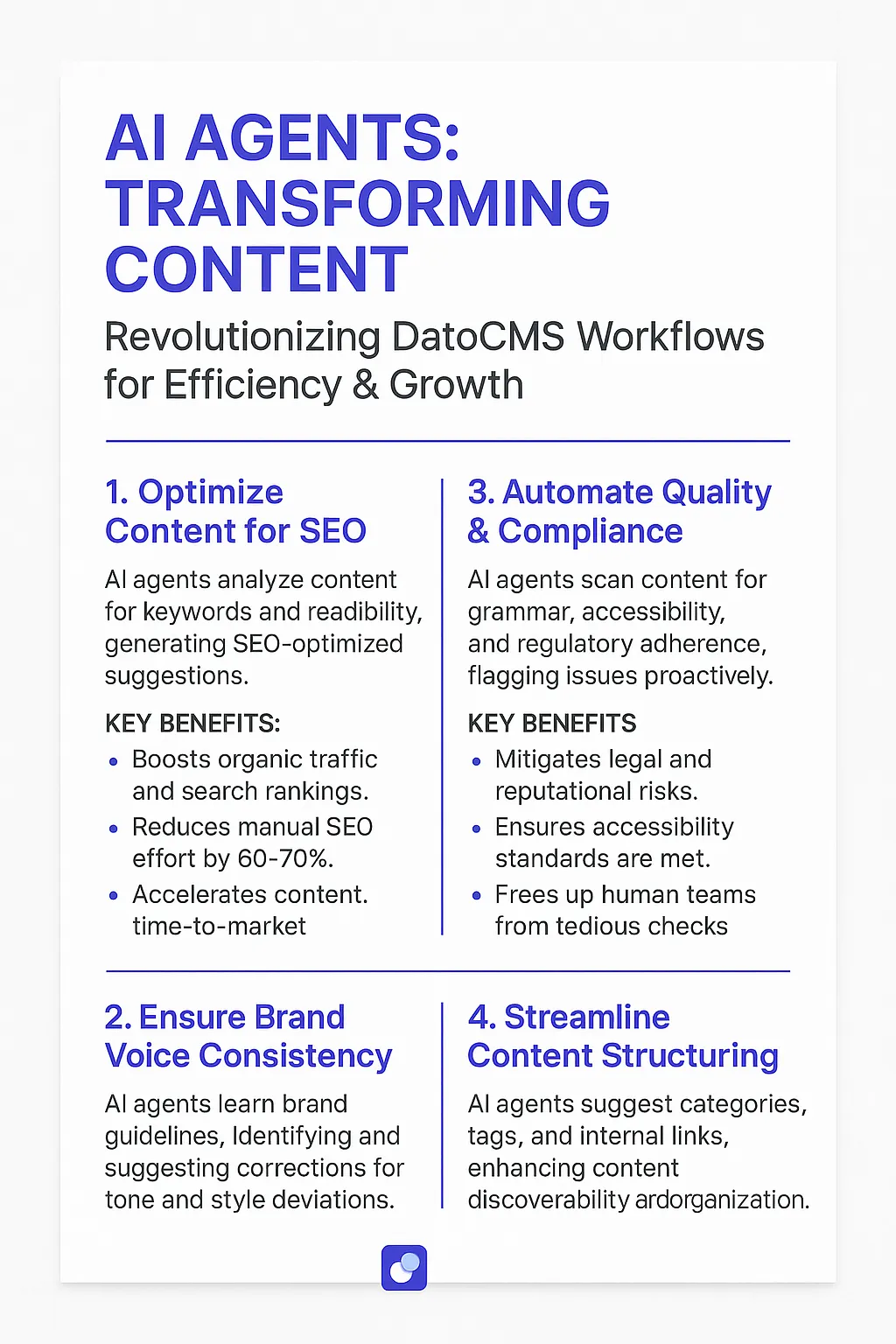DatoCMS
Understanding DatoCMS and Its AI-Powered Evolution
What is DatoCMS?
DatoCMS stands as a headless content management system that separates content creation from presentation. The platform enables organizations to structure, manage, and deliver content across multiple channels while maintaining consistency and scalability. Unlike traditional CMS platforms, DatoCMS provides API-first architecture that allows content to flow seamlessly to any digital endpoint.
Key Features of DatoCMS
The platform excels in content modeling flexibility, allowing teams to create custom structures that match specific business needs. Its robust API capabilities enable seamless content delivery across channels, while the intuitive interface makes complex content management accessible to non-technical users. The system's modular architecture supports enterprise-scale operations while maintaining performance and reliability.

Benefits of AI Agents for DatoCMS
What would have been used before AI Agents?
Content management with DatoCMS traditionally required manual effort across multiple touchpoints. Teams needed to write, format, and structure content while ensuring proper metadata tagging and SEO optimization. This meant content creators spent significant time on technical aspects rather than focusing on creative work. They relied on style guides, checklists, and often needed developer support for complex content modeling.
What are the benefits of AI Agents?
AI Agents transform DatoCMS workflows by handling the heavy lifting of content operations. They automatically generate SEO-friendly meta descriptions, suggest optimal content structures, and even help create content models that align with business objectives.
The real power comes from their ability to learn your content patterns. These digital teammates analyze existing content to understand brand voice, formatting preferences, and technical requirements. They then apply these learnings to new content, maintaining consistency while reducing manual oversight.
For technical teams, AI Agents simplify content modeling by suggesting field types and relationships based on content analysis. They can identify patterns in content structure and recommend optimizations that would typically require extensive manual analysis.
Content creators gain a powerful ally that handles routine tasks like tag generation, content categorization, and formatting checks. This shifts their focus from technical details to strategic content creation. The AI's ability to provide real-time suggestions during content creation helps maintain quality standards without constant reference to documentation.
The network effects are particularly compelling - as more content flows through the system, the AI Agents become increasingly adept at understanding specific organizational needs and content patterns. This creates a compounding efficiency that grows with usage.

Potential Use Cases of AI Agents with DatoCMS
Content Creation and Optimization
AI Agents transform DatoCMS workflows by generating SEO-optimized meta descriptions, alt text for images, and content summaries. The agents analyze existing content patterns and brand voice to maintain consistency across the content management system while reducing manual input time by 60-70%.
Data Structure Management
When working with complex content models, AI Agents automatically suggest optimal field types and relationships based on content patterns. They detect redundancies in content structures and propose more efficient schemas, leading to cleaner, more maintainable content architectures.
Content Migration and Organization
During large-scale content migration, AI Agents parse unstructured content and map it to appropriate DatoCMS fields. They identify content categories, tag relationships, and create structured hierarchies that would typically require hours of manual content organization.
Multilingual Content Management
AI Agents handle the complexities of managing multilingual content by detecting language patterns, suggesting translations, and maintaining consistency across different locales. They flag potential cultural nuances and ensure content remains contextually relevant across markets.
Quality Assurance and Compliance
The agents continuously monitor content for brand guideline adherence, accessibility standards, and regulatory compliance. They flag potential issues before publication and suggest improvements, reducing the risk of non-compliant content reaching production.
Performance Optimization
AI Agents analyze content delivery patterns and suggest optimizations for better performance. They identify heavy assets that might impact load times and recommend more efficient alternatives while maintaining content quality.
Content Governance
Through pattern recognition and learning from user behaviors, AI Agents establish and maintain content governance frameworks. They ensure consistency in naming conventions, field usage, and content organization across large teams and complex projects.
These use cases demonstrate how AI Agents elevate DatoCMS from a content management system to an intelligent content operations platform, enabling teams to focus on strategic decisions while automating routine tasks.

Industry Use Cases
DatoCMS AI agents fundamentally transform how different sectors approach content management and digital experiences. These digital teammates integrate seamlessly into existing content workflows, bringing specialized capabilities that address unique industry challenges. From media companies managing vast content libraries to e-commerce brands coordinating product information across multiple channels, the applications are both practical and impactful.
The real power lies in how these AI agents adapt to industry-specific content models and workflows. They don't just process data - they understand the context, terminology, and requirements unique to each sector. For example, a fashion retailer can leverage these agents to maintain consistent product descriptions across thousands of SKUs, while a publishing house might use them to optimize content metadata for better discoverability.
What makes this particularly interesting is how the AI agents learn and evolve with each interaction, becoming more attuned to industry-specific nuances and requirements. This creates a compounding effect where the value delivered grows exponentially over time as the system becomes more sophisticated in handling specialized content management tasks.
E-commerce Product Management with DatoCMS AI Agents
Online retailers face the constant challenge of managing thousands of product descriptions, specifications, and multimedia assets across multiple channels. DatoCMS AI Agents transform this traditionally labor-intensive process into a dynamic, intelligent operation.
When a fashion retailer adds new seasonal collections, the AI Agent automatically generates SEO-optimized product descriptions that maintain brand voice while highlighting key features. For example, a luxury handbag description would emphasize craftsmanship details, materials, and styling possibilities - all while maintaining the premium positioning that luxury customers expect.
The AI Agent's deep learning capabilities mean it understands product context. It knows that "grain" in leather goods refers to texture patterns, while "grain" in furniture describes wood characteristics. This contextual awareness ensures accurate, nuanced content creation.
Beyond description generation, the AI Agent handles real-time content adaptation. When a product needs to be marketed differently across regions - perhaps more formally in Europe versus casually in North America - the Agent automatically adjusts tone and terminology while preserving core product information.
The system also excels at maintaining content consistency. When product specifications change, the AI Agent automatically updates all related content pieces, from technical specs to marketing copy, ensuring customers always see accurate information.
This level of intelligent automation allows e-commerce teams to focus on strategy and creative direction rather than repetitive content tasks. The result is both increased operational efficiency and higher quality product content that drives conversions.
Media Publishing Excellence Through DatoCMS AI Agents
Publishing organizations operate in a complex ecosystem where content velocity meets editorial excellence. The DatoCMS AI Agent functions as a digital teammate that enhances newsroom operations while preserving journalistic integrity.
Major news organizations handle thousands of stories daily across multiple formats - from breaking news to long-form features. The AI Agent excels at content adaptation, transforming a primary news article into various formats while maintaining factual accuracy and editorial standards. A 2,000-word investigative piece can be intelligently reformatted into social media snippets, newsletter summaries, and mobile-optimized versions.
The system's natural language processing capabilities enable smart content tagging and categorization. When editors upload new articles, the AI Agent automatically analyzes the content, identifies key themes, and applies relevant metadata. This sophisticated categorization powers personalized content recommendations and improves searchability across the publication's archive.
Content localization becomes seamless as the AI Agent handles nuanced translations that respect cultural context and local news angles. A tech story about Silicon Valley startups gets automatically adapted for European audiences with relevant EU regulatory context and local market comparisons.
The AI Agent also supports editorial teams with real-time fact-checking and source verification. It cross-references claims against trusted databases and flags potential inconsistencies for human review. This additional layer of verification helps maintain high journalistic standards while accelerating the publishing process.
Most importantly, the system learns from editorial decisions and feedback. Each edit and correction trains the AI Agent to better understand the publication's style guide and quality standards. This creates a virtuous cycle where the technology continuously adapts to support the newsroom's specific needs and workflows.
Considerations and Challenges
Implementing AI agents within DatoCMS requires careful planning and strategic consideration of both technical infrastructure and team dynamics. The integration process presents specific hurdles that teams need to navigate.
Technical Challenges
Content model complexity often creates the first major roadblock. AI agents need clear parameters to understand and interact with your existing content structures. When content models become too intricate or interconnected, agents may struggle to maintain consistency across related entries.
API rate limiting poses another significant technical constraint. DatoCMS AI agents make frequent API calls, which can quickly consume rate limits during peak usage. Teams need to implement robust queue management and rate limiting strategies to prevent disruptions.
Data validation becomes more nuanced with AI-generated content. While agents can create content rapidly, ensuring it meets brand guidelines, tone requirements, and technical specifications requires sophisticated validation rules and potential human oversight.
Operational Challenges
Content workflow adaptation represents a critical operational shift. Teams must redesign their review processes to account for AI-generated content, establishing clear checkpoints for quality control and compliance verification.
Training requirements increase significantly as team members need to understand both DatoCMS functionality and AI agent capabilities. This dual knowledge requirement can slow initial implementation and require ongoing education efforts.
Cost management demands careful attention. AI agent usage costs can accumulate quickly, especially during high-volume content generation periods. Teams need to develop clear usage guidelines and monitoring systems to prevent budget overruns.
Version control becomes more complex with AI-generated content. Teams need robust systems to track changes, maintain content history, and manage potential conflicts between human and AI-generated updates.
AI-Powered Content Management: A Transformative Future
The integration of AI Agents into DatoCMS marks a fundamental shift in content management capabilities. These digital teammates don't just automate tasks - they learn, adapt, and improve over time, creating compound benefits for organizations. While challenges exist in implementation and management, the transformative potential for content operations is clear. Organizations that successfully navigate these challenges position themselves to leverage AI-powered content management for significant competitive advantage.













